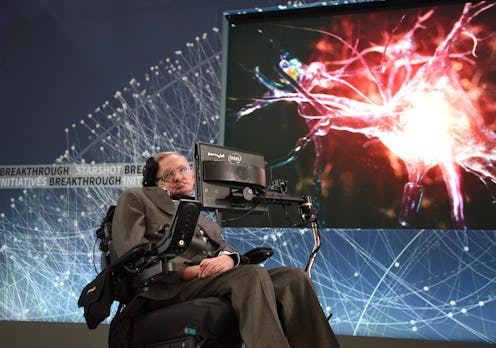
On Tuesday night, the world went to bed to some sad news: arguably the world's most renowned physicists had died at age 76. How Stephen Hawking died can be traced back to complications caused by the terminal neurological disease he lived with for decades on end. But being unable to speak on his own and confined to a wheelchair never stopped him from inspiring people to be so fascinated by our universe.
The Guardian reported that after being diagnosed with amyotrophic lateral sclerosis (ALS) at just 21, Hawking said his life changed — but not necessarily for the worst.
Although there was a cloud hanging over my future, I found, to my surprise, that I was enjoying life in the present more than before. I began to make progress with my research. ... My goal is simple. It is a complete understanding of the universe, why it is as it is and why it exists at all.
In a statement, according to the Guardian, the Hawking family remembered the physicist's unforgettable contributions to both science and humanity.
He was a great scientist and an extraordinary man whose work and legacy will live on for many years. His courage and persistence with his brilliance and humour inspired people across the world. He once said: "It would not be much of a universe if it wasn't home to the people you love." We will miss him for ever.
Neil deGrasse Tyson tweeted that Hawking's passing left a "kind of vacuum energy permeating the fabric of spacetime that defies measure." Well, that's essentially the definition of a black hole, which happens to be the phenomena Hawking helped explain in detail to the world.
Though Hawking's death left a vacuum, it's worth noting that his disease didn't defeat him. In fact, he lived with it much longer than doctors ever expected. ALS, also known as Lou Gehrig's disease, is neurodegenerative and causes paralysis. Though the disease usually kills a person in just a few years, his form of ALS progressed more slowly than usual.
After Hawking turned 70 years old, Scientific American interviewed Leo McCluskey, an associate neurology professor and medical director of the the University of Pennsylvania's ALS Center. He explained that scientists are currently looking for cures to the terminal illness.
Beginning in 2006 it became clear that like a lot of other neurodegenerative diseases, ALS was determined by the accumulation of abnormal proteins in the brain. Ten percent of ALS is genetic and based on a gene mutation. I'm sure there are also at-risk genes for ALS, but there are now multiple genes that have been identified as potentially causing the disease.
According to the ALS Association, slightly more than 6,000 Americans are diagnosed with the disease every year and up to 20,000 Americans could be living with it at any point in time. And about 10 percent of those Americans live at least another 10 years after diagnosis. The association explained on its official site how the disease runs its course for most individuals.
Once ALS starts, it almost always progresses, eventually taking away the ability to walk, dress, write, speak, swallow, and breathe and shortening the life span. How fast and in what order this occurs is very different from person to person. While the average survival time is 3 years, about twenty percent of people with ALS live five years, 10 percent will survive ten years and five percent will live 20 years or more.
Though the terminal illness is absolutely heartbreaking, McCluskey did point out to Scientific American that Hawking's case offers up hope that people diagnosed can still lead long, full lives.